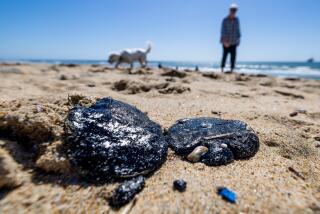China seeks to stem Bohai Sea oil spills
China is moving to contain two oil spills in the Bohai Sea off the nation’s northeast coast amid complaints from environmental groups and online activists that it took weeks for government regulators and an oil company to publicly disclose the incidents.
The spills occurred below two platforms jointly owned by U.S. energy giant ConocoPhillips’ China subsidiary and the state-owned China National Offshore Oil Corp., or CNOOC, creating a 320-square-mile oil slick that’s reportedly spreading.
The State Oceanic Administration, China’s coastal regulator, on Wednesday ordered ConocoPhillips to shut down operations at the platforms located at an oilfield known as Penglai 9-13.
Though the first spill occurred June 4 and the second June 17, the incidents were not disclosed to the public until July 5 by the State Oceanic Administration.
Environmental activists said attempts to cover up the spills were thwarted when word leaked online, possibly from a whistleblower.
Officials at CNOOC have denied a cover-up. The coastal regulatory agency could not be reached for comment.
ConocoPhillips said in a statement that it estimates between 1,500 and 2,000 barrels have leaked into the sea due to seepage from a naturally occurring fault. The company said it has contained the spill to trace amounts, equal to a few liters a day and that no oil had reached shore.
Activists remain deeply skeptical about the severity of the spills given China’s notoriously weak enforcement of environmental laws, which they say favor economic interests above all.
The spills come a year after one of the worst oil disasters in Chinese history, when explosions rocked two pipelines in the coastal city of Dalian. Although the government said 11,000 barrels of oil were spilled back then, independent experts put the amount at 650,000 barrels.
The Dalian incident came on the heels of another environmental disaster, in which the state-owned Zijin Mining Group Co. waited nine days before disclosing a chemical spill in Fujian province that polluted a river that had been heavily relied upon for its fish.
Ma Jun, head of the Institute of Public and Environmental Affairs, a nongovernmental organization in Beijing, said China’s disclosure laws for such disasters were vague and fines for polluting were too small.
“For decades, China’s policy is to promote economic development,” Ma said. “So all of these companies have enjoyed some special protection.”
The stiffest penalty oil companies can face for polluting waters in China is about $30,000. By comparison, BP may face tens of billions of dollars in penalties after last year’s spill in the Gulf of Mexico.
In recent days, Chinese state media have criticized regulators for being weak.
“We cannot help but wonder: Is the [State Oceanic Administration] a serious watchdog that exists to prevent bigger incidents from happening, or a loving parent who is overprotective of his own child?” read an editorial in the English edition of the Global Times.
Chinese oil demand has soared to fuel its sizzling economic growth. To keep up, the country has had to increasingly rely on foreign sources, including suppliers from some of the most volatile regions in the world.
Seeking a safer alternative, the government has invested billions of dollars in boosting its offshore oil production.
“With more and more interest invested into offshore oil exploration, there’s a really urgent need to start improving” environmental safety measures, said Li Yan, the climate and energy campaign manager at Greenpeace East Asia.
If “measures are not taken, this could just happen again,” Li said.
It remains to be seen how much damage to wildlife has been caused by the Bohai Sea spills.
Zhai Yuxiu, deputy director of the National Center for Quality Supervision and Testing of Aquatic Products, said that even slight differences in water temperature and quality could be catastrophic for the area’s fishing industry.
“The pollution will absolutely have an influence,” he said.
This week, a coalition of 11 Chinese environmental advocacy groups announced plans to file a joint lawsuit in hopes of garnering more transparency in the oil industry.
Alex Wang, a Chinese environmental law expert at UC Berkeley Law School, said there was little hope of the lawsuit reaching court.
“In China, incidents of this magnitude are seldom ever handled in the courts,” Wang said. “They’ll almost always be handled by the government.”
Kaiman is a special correspondent. Nicole Liu in The Times’ Beijing bureau contributed to this report.
More to Read
Start your day right
Sign up for Essential California for news, features and recommendations from the L.A. Times and beyond in your inbox six days a week.
You may occasionally receive promotional content from the Los Angeles Times.






